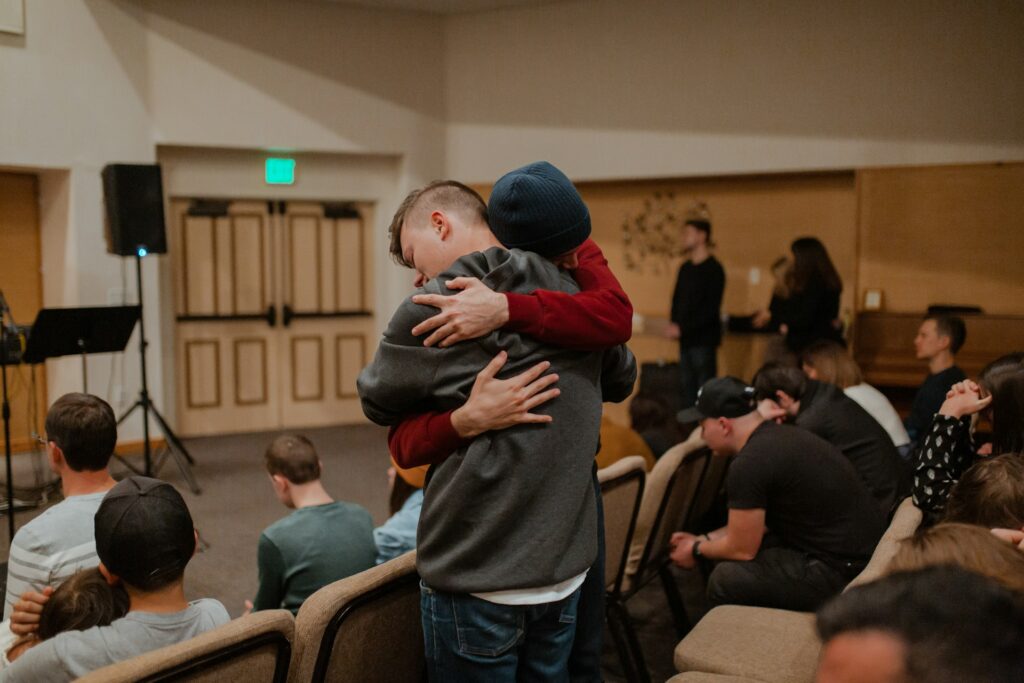It’s not always easy to know what to say when someone you care about is going through a rough time.

You don’t want to say the wrong thing or come across as dismissive, but staying silent doesn’t feel right either. The truth is, you don’t need perfect words — you just need to show up with care, presence, and a bit of emotional awareness. These phrases aren’t magical fixes, but they can open the door to connection when someone really needs it.
1. “I’m really glad you told me.”

When someone opens up about something heavy, it usually takes a lot of courage. Saying this lets them know they didn’t make a mistake by coming to you. It helps quiet that voice in their head that might be wondering, “Did I overshare?” or “Should I have kept that to myself?” You’re telling them that their honesty is welcome and respected — not something to be ashamed of.
It’s a short but powerful way to validate vulnerability. You’re showing them they don’t have to carry things alone and that their story matters. Even if you’re not sure what else to say, this one holds space in a way that makes people feel seen and safe.
2. “You don’t have to go through this alone.”

This little reminder can cut through a lot of emotional noise. When someone’s hurting, it’s easy for them to feel isolated, even when they’re surrounded by people. They might believe they have to figure it all out themselves or not burden anyone with what they’re carrying. Hearing this reminds them that help is available, and that you’re willing to be there, not just once, but as things unfold.
It’s not about having all the answers or being their therapist. It’s about letting them know they’re not a problem to be fixed, they’re a human being worthy of support. And sometimes, just knowing that someone’s walking beside you makes the road a little easier to handle.
3. “It’s okay if you don’t know how to explain it yet.”

Not everything that hurts comes with neat words or a clear timeline. When you say this, you’re removing pressure and giving them permission to feel confused, overwhelmed, or even numb. You’re telling them they don’t have to present their pain in a polished way for it to be valid. This is especially helpful if someone’s struggling to describe what’s wrong but clearly needs a safe place to land.
It’s a gentle way of saying, “You don’t have to perform your pain for me — I’m still here.” That kind of emotional space allows trust to build naturally, and it often leads to more honest conversations down the line. Sometimes people just need the freedom to not have it all figured out yet.
4. “That sounds really hard — I’m so sorry you’re going through this.”

People often skip to advice or reassurance when someone’s in pain, but that can unintentionally dismiss how heavy things feel. This does the opposite — it acknowledges the weight of what they’re carrying. You’re not trying to fix it or downplay it. You’re simply sitting beside their pain and recognising it for what it is.
When someone feels seen in their struggle, it creates a moment of relief. They don’t have to defend how bad things feel or justify why they’re upset. You’re letting them know their reaction is understandable and that their pain is valid, and that alone can be deeply healing.
5. “Would it help to talk about it, or would you rather do something distracting?”

Giving someone options shows that you respect their emotional bandwidth. Sometimes people want to talk, and other times they just want to forget what’s going on for a little while. Offering both choices calmly says, “I’ll meet you where you are.” You’re showing up without an agenda, just presence and flexibility.
This kind of support can feel really grounding because it puts the ball in their court. You’re not pressuring them to open up or pretending to know what they need. You’re simply letting them decide, which in itself can be empowering when everything else feels out of control.
6. “You don’t have to be ‘on’ with me.”

There’s so much pressure to be okay, even when you’re clearly not. Saying this gives them permission to drop the mask, the forced smile, or the “I’m fine” routine. You’re offering a rare kind of space — one where they don’t have to perform emotional stability or act cheerful when they’re struggling inside.
That acceptance is powerful. It creates a sense of ease and safety that lets people exhale for the first time in days or weeks. When someone knows they can be their raw, real self with you, it deepens connection and helps them start healing on their own terms.
7. “Is there anything that’s been helping, even a little?”

This question invites reflection without pressure. It helps them focus on what’s been working, even in small ways, and opens the door to positive conversation without jumping into advice. It also reminds them that they’ve already made it through hard moments and might have tools they haven’t recognised yet.
Sometimes, just saying out loud what’s helped — whether it’s music, walking, or talking to a friend — can reinforce their resilience. It helps shift the conversation toward what supports them, not just what’s hurting, while still keeping it gentle and real.
8. “I care about you, no matter what.”

In hard times, people often worry that they’re becoming a burden or that they’re pushing people away. This phrase cuts through that fear and offers something steady to hold onto. It tells them that your care isn’t conditional, and they don’t have to earn it by being cheerful, productive, or emotionally easy to deal with.
Those words might not seem like much, but they land deeply when someone’s in a dark place. You’re offering the kind of love or friendship that sticks — the kind that doesn’t flinch when things get uncomfortable. That reassurance can plant the first seeds of trust again.
9. “Want me to just sit with you for a bit?”

Sometimes words aren’t what people need most — it’s presence. Offering to sit with someone says, “You don’t have to go through this moment alone, and you don’t need to say anything if you don’t want to.” That laid-back support can be more powerful than any advice or pep talk.
Being there without needing to fill the silence takes the pressure off them to be social or articulate. It makes space for rest and safety, which are often the first things to go when someone’s struggling. And it shows them you’re comfortable enough to just be there, no explanations needed.
10. “Take your time — I’m not going anywhere.”

When people are struggling, they often feel rushed to “get better” or explain themselves quickly. This phrase removes that timeline. It says you’re not expecting neat answers or emotional progress on a deadline. You’re offering patience — one of the most underrated kinds of support there is.
Knowing that someone isn’t in a hurry for you to recover or “act normal” again can be deeply comforting. It makes space for real healing to happen — the slow, awkward, imperfect kind. And that kind of support lasts longer than any perfectly timed words ever could.



